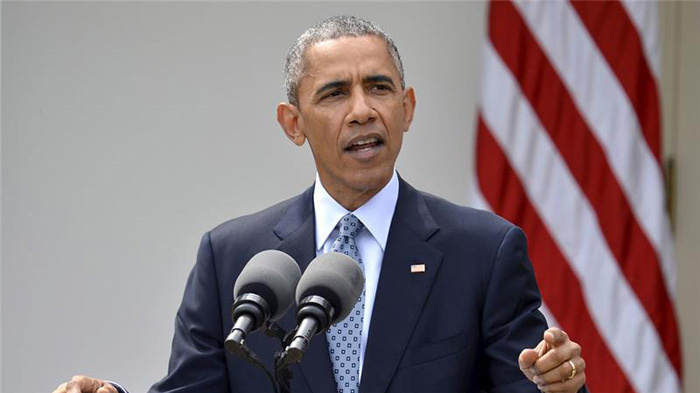Obama’s Weak Leadership Endangers the Nuclear Deal
By Kaveh L. Afrasiabi

In spite of serious progress in drafting the final comprehensive nuclear agreement after very difficult rounds of multilateral diplomacy, the absence of decisive White House leadership has emerged as a key stumbling block threatening the prospect for a 'win-win' deal.
Instead of demonstrating strength, clarity of purpose, and single-minded determination to reach a mutually-satisfactory nuclear deal with Iran, U.S. President Barack Obama has sadly begun to evince the opposite symptoms of a weak, waffling, and even self-contradictory leader who has failed to mount an effective stance against his Republican critics accusing him of an Iran appeasement. In order to ward off those criticisms, shared by some hawkish members of his own party, Obama has seemingly opted for stiffening U.S.'s demands at the negotiation table, much to the chagrin of Iranian, Russian, and even European diplomats, who have warned that this would be tantamount to re-negotiating the issues already settled.
Not only that, adding salt to injury, the White House has at the same time taken the upper hand by pointing the finger at Iran and threatening to walk away from the talks, when it is abundantly clear that it is solely responsible for scuttling the chances for a breakthrough deal in recent days. Ironically, prior to July 7th, when some U.S. negotiators were sounding pretty upbeat about the emerging deal, Obama managed to dampen the hopes by sounding pessimistic and giving the deal less than a fifty percent chance of success.
According to the U.S. media, after his video conferencing with Secretary of State John Kerry on July 7th, Obama's tough new line was adopted by Kerry who relayed the same sentiment in his brief press conference on July 9th. The question is, of course, if these changes in U.S. nuclear diplomacy are tactical in nature and are intended as passing maneuvers or rather strategic and more meaningful than mere "public gestures" aimed at better jockeying for extracting concessions from Iran?
A definite answer to this question must await the passage of time and is perhaps a topic of research for future historians -- who may interpret this past week's rather strange and baffling U.S. negotiation behavior as a sign of deep U.S. ambivalence about the pros and cons of ending the Iran nuclear stalemate. After all, with the existing hostilities between U.S. and Iran, Washington is concerned that a post-sanctions Iran could emerge as an even bigger and more formidable challenge in the Middle East theater. Despite serious gestures by Iran, including by Foreign Minister Javad Zarif, urging a common strategy against terrorism after the nuclear deal, so far there is no substantial evidence of reciprocity on the part of U.S. policy-makers, some of whom, e.g., the Defense Secretary Ashton Carter, never fail to express their disdain and open hostility toward Iran. Clearly, Pentagon and the Kerry-led U.S. Department of State are not on the same page when it comes to Iran, and the National Security officials headed by Susan rice appear to be closer to Carter than to Kerry.
As for the 'lame duck' President Obama himself, who needs to assert leadership and insulate himself from the avalanche of pro-Israel pressures in order to strike a historical agreement with Iran that would be in the interest of both U.S., non-proliferation cause, and regional and global peace and tranquility, he is bound to have a poor legacy in the realm of foreign policy if he fails the crucial test of his presidency and continues with his present pattern of weak and incoherent approach toward Iran. Perhaps the White House has yet to calculate properly the sunk costs of walking away from a potential Iran deal, in terms of damages to U.S. prestige, the cost of maintaining the sanctions regime on Iran despite the will of international community to the opposite, etc. This in turn might explain why the White House has recently toyed with the notion of an "open-ended" negotiation, whereby instead of a final deal heralding the end of sanctions on Iran, the interim Geneva agreement would be extended, i.e., a poor substitute that would continue with the freezing of Iran's assets and provide only token relief to Iran. The delusional White House officials entertaining this possibility are simply sowing the seeds of a permanent Iran nuclear crisis, as one that would put the U.S. in leadership of an international "contain Iran" coalition. The problem with this scenario is that that coalition is rapidly falling apart and many nations have stopped bothering to even report to the U.N. Iran sanctions committee and some of U.S.'s allies have begun to make the post-sanctions adjustments by entering into new trade agreements with Iran. As a result, if the talks fail and U.S. escalates the sanctions regime, it will open the Pandora's Box of triggering new tensions with its own allies.
In conclusion, in light of the above-stated considerations, it is in U.S.'s own interest to continue the long diplomatic march toward a just and equitable Iran nuclear deal, which cannot be reached as long as the necessary ingredient of 'smart power' and political will is absent in Washington.

